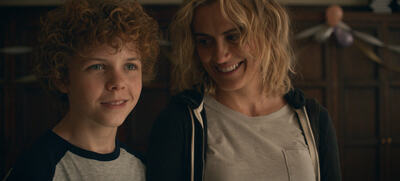
Sometimes, it’s nice to have a good cry. And some of the best artists recognize that; Lord knows Jason Katims, who spearheaded thoughtful TV weepies like “Parenthood” and “Friday Night Lights,” does. But his latest for Apple TV+, an adaptation of Ann Napolitano’s acclaimed novel Dear Edward, tips its hand more than a bit too far: it’s less a heartbreaking story in its own right than a perfectly-calibrated waterworks machine, one designed to trap its audience in ten hours of communal misery and grief.
In the fields outside a small town in Colorado, a passenger plane crashes. Two hundred-plus lives aboard are lost, save for one: 12-year-old Edward (newcomer Colin O’Brien), who lost his entire family—including his older brother and best friend Jordan (Maxwell Jenkins)—in the crash. The shocked and traumatized child is quickly dubbed “Miracle Boy” by a press hungry for uplifting stories and sent to live with his bitter estranged Aunt Lacy (Taylor Schilling) and husband John (Carter Hudson), who’ve been trying successfully to have their own child for years.
Ostensibly, Eddie’s arrival should be a godsend for them after years of miscarriages. But life isn’t that easy; Plus, everyone’s got deep wounds in need of healing, some inflicted long before the crash.
One of the most interesting yet structurally damning changes Katims makes from the book is widening the narrative tapestry outside of Edward’s experience. After all, hundreds of others died on that flight, all with loved ones rummaging through their emotional wreckage. There’s Connie Britton’s brash New Jersey empty nester Dee Dee, Anna Uzele’s AOC-lite political hopeful Adriana, Amy Forsyth’s Linda, a pregnant teen whose boyfriend died in the crash. The list goes on and on, too voluminous to list here.

In the wake of the crash, they find community in the form of a corporate-sponsored support group, where their lives intersect in all the ways you’d expect of a maudlin melodrama such as this. Some end up sleeping together; others open up or resolve old family wounds. Still, others crumble under the secrets and lies left behind by spouses who aren’t around to guard them anymore. It’s a lot to take in, especially when stacked on top of each other; characters will disappear for entire episodes with little fanfare as if placed in storage until the next little chapter of their tragedy.
But what about Edward? Amongst all the sturm und drang of the grownups’ varying tribulations, little Eddie can sometimes get lost in the shuffle. It’s a shame, too; apart from him being, as Beanie Feldstein would say, the titular role, O’Brien’s wounded, withdrawn performance offers the most complete, multifaceted journey among the sprawling ensemble that surrounds him. His youth and innocence compound the tragedy that’s befallen him, an orphaned boy thrust both into a family situation that wasn’t prepared for him and a media landscape that makes him the repository of everything from well-intentioned love to oversharing to conspiracies and death threats. All he has to cling to is the memory of his brother and the guilt of knowing that a game of rock-paper-scissors over which seat they’d take sealed their respective fates.
Granted, it’s all performed with admirable grace and confidence thanks to a committed cast that, at the very least, keeps the thing aloft in each tearjerking moment. Apart from O’Brien, other standouts include Schilling, who infuses Lacy with relatably brittle neuroses, and Dario Ladani Sanchez’s Sam, for whom the loss of an old high school friend in the crash awakens latent conflicts about his sexuality—especially complicated given that he’s married with kids.

But it’s Britton who infuses the most life into the otherwise-dour cast; Dee Dee’s larger-than-life brashness and volatility offer a welcome respite from the downbeat bummers around her, whether she’s rage-eating sympathy cupcakes or telling well-meaning yoga neighbors to “shove [their] kombucha up [their] ass”. Where everyone else feels like a zombie shuffling through the ruins of their deteriorated lives, she demands to see life’s manager, and it’s delightful.
But when the show veers away from Dee Dee or Edward towards its bloated tertiary cast, it becomes hard to, as Lizzy McAlpine mewls through most of the show’s treacly, guitar-folk theme, “hold on” to your attention. There are so many threads to follow, several of whom cover virtually identical territory (married men navigating their sexuality, victims falling in love with family members of other victims), and it’s all weighed down with the same heavy blanket of weepy sincerity. Katims is downright aggressive in how he piles one sadness on top of another, trapping his characters in inescapable dilemmas with little respite.
The repetition and the predictability of these lesser threads gets old fast, especially the longer they take away screentime from the more compelling (and complete) meditation on grief we see in Edward. Perhaps “Dear Sad Relatives of Crash Victims, feat. Edward” would have been a more apt title.
Those looking for something to fill that “This Is Us”-shaped hole in their media diet will flock to “Dear Edward”; after all, both shows have all the airy, acoustic-guitar contemplation of a laundry detergent commercial. But as meditations on grief go, Katims seems more content to engineer contrived soap-opera agonies than fully exploring what it means to lose everything and do your best to dust yourself off and keep going. And it’s especially egregious considering the show’s clear bid for a second season in its closing moments, when the path Edward and his fellow survivors plan to take hardly seems more interesting than the one they already traveled.
Entire season was screened for review. “Dear Edward” is now playing on Apple TV+.




